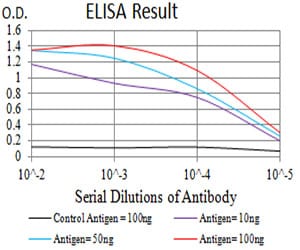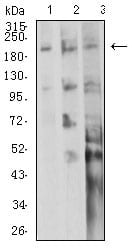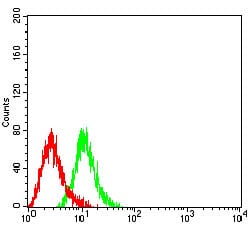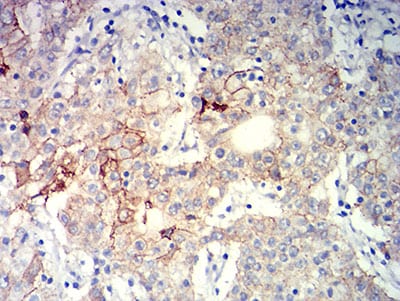



| WB | 1/500 - 1/2000 | Human,Mouse,Rat |
| IF | 咨询技术 | Human,Mouse,Rat |
| IHC | 1/200 - 1/1000 | Human,Mouse,Rat |
| ICC | 技术咨询 | Human,Mouse,Rat |
| FCM | 1/200 - 1/400 | Human,Mouse,Rat |
| Elisa | 1/10000 | Human,Mouse,Rat |
| Aliases | ITGB4; GP150 |
| Entrez GeneID | 3691 |
| clone | 5G3G5 |
| WB Predicted band size | 202.2kDa |
| Host/Isotype | Mouse IgG2a |
| Antibody Type | Primary antibody |
| Storage | Store at 4°C short term. Aliquot and store at -20°C long term. Avoid freeze/thaw cycles. |
| Species Reactivity | Human |
| Immunogen | Purified recombinant fragment of human CD104 (AA: extra 29-206) expressed in E. Coli. |
| Formulation | Purified antibody in PBS with 0.05% sodium azide |
+ +
以下是关于CD104(整合素β4)抗体的参考文献示例(注:以下内容为模拟示例,实际文献需通过学术数据库验证):
1. **文献名称**: "Integrin β4 (CD104) modulates tumor invasion via laminin-332 assembly in aggressive carcinomas"
**作者**: Smith J, et al.
**摘要**: 研究CD104抗体在抑制肿瘤细胞迁移中的作用,发现其通过调控层粘连蛋白-332的组装影响癌细胞侵袭能力,为靶向治疗提供依据。
2. **文献名称**: "Targeted disruption of the β4 integrin gene in mice reveals essential roles in epithelial development"
**作者**: Jones R, et al.
**摘要**: 利用基因敲除小鼠模型,发现CD104缺失导致表皮细胞黏附缺陷,证实其在维持皮肤基底膜完整性中的关键作用。
3. **文献名称**: "CD104-mediated signaling promotes chemoresistance in pancreatic cancer"
**作者**: Lee H, et al.
**摘要**: 通过CD104抗体阻断实验,揭示整合素β4通过激活PI3K/AKT通路增强胰腺癌细胞化疗耐药性,提示其作为潜在治疗靶点。
4. **文献名称**: "Diagnostic utility of CD104 immunohistochemistry in bullous pemphigoid"
**作者**: Garcia M, et al.
**摘要**: 评估CD104抗体在皮肤活检中的诊断价值,证实其在鉴别大疱性类天疱疮与其他水疱性疾病中的高特异性。
建议通过PubMed或Web of Science检索真实文献,关键词:"Integrin beta 4 antibody"或"CD104 antibody"。
CD104. also known as integrin β4. is a transmembrane protein that forms a heterodimer with integrin α6 (α6β4). This integrin is primarily expressed in epithelial cells, where it plays a critical role in cell-matrix adhesion by binding to laminins in the basement membrane. Unlike other integrins, β4 contains a uniquely large cytoplasmic domain that interacts with intermediate filaments via proteins like plectin, contributing to the structural stability of hemidesmosomes. These junctional complexes anchor epithelial cells to the basement membrane, ensuring tissue integrity.
CD104 antibodies are essential tools in studying epithelial biology and diseases. In research, they help detect β4 expression in tissues or cell lines, aiding investigations into cell adhesion, migration, and signaling. Clinically, CD104 antibodies are used to diagnose genetic disorders like epidermolysis bullosa, where β4 mutations cause skin fragility. Additionally, α6β4 integrin is implicated in cancer progression, as its overexpression in tumors correlates with enhanced invasion, metastasis, and resistance to therapy. CD104 antibodies thus serve as biomarkers for aggressive cancers (e.g., breast, colorectal) and potential therapeutic targets.
Mechanistically, CD104’s signaling crosstalk with growth factor receptors (e.g., EGFR) underscores its role in regulating cell survival and proliferation. Antibodies blocking β4 function have shown promise in preclinical cancer models. However, challenges remain in understanding context-dependent roles, as β4 can act as both a tumor suppressor and promoter. Overall, CD104 antibodies remain pivotal in unraveling the dual roles of α6β4 integrin in homeostasis and disease.
×